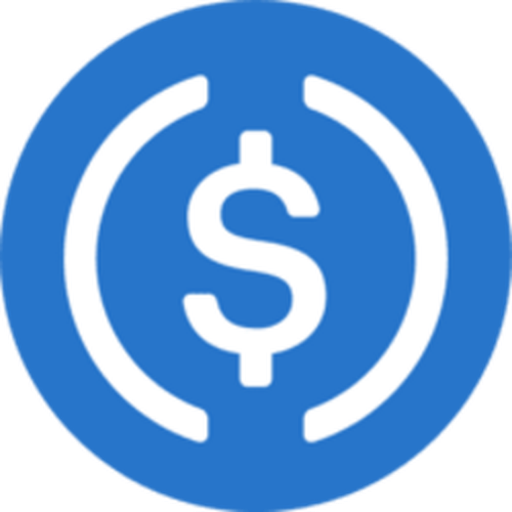USDC vs Ozone Chain – Price, Market Cap & Performance Compared
Which coin performs better – USDC or Ozone Chain?
We compare the current price (0.99971 $ vs 0.13191 $), market cap (74 153 765 385 vs 116 134 713) and all-time high (1.17 vs 0.48508).
Find out which one stands out right now!
USDC is currently trading at 0.99971 $, while Ozone Chain stands at 0.13191 $. These cryptocurrencies differ not only in price but also in market presence.
The market cap of USDC is around 74 153 765 385, and Ozone Chain has about 116 134 713. Their respective all-time highs are 1.17 for USDC and 0.48508 for Ozone Chain.
Daily trading volume and the 24h price change (-0.00009 % vs -0.09469 %) also offer key insights.
Compare all metrics now and see which coin fits your investment strategy best!
USDC
USD Coin (USDC) is a stablecoin that is pegged to the US dollar, offering a consistent value and reducing the volatility often associated with cryptocurrencies. It provides a crucial bridge between traditional financial systems and digital currency markets, facilitating easy and secure transactions. USDC's foundation on blockchain technology ensures transparency and enhances trust among users and institutions.
more informationOzone Chain
Ozone Chain is rapidly gaining traction in the blockchain ecosystem by focusing on sustainability and eco-friendly solutions. Its innovative approach aims to reduce the environmental impact of traditional cryptocurrencies while promoting efficient transactions. As more users and developers recognize the value of green technology, Ozone Chain is positioning itself as a leader in the sustainable crypto movement.
more information

|

|
|
|
|
General Information |
|
|---|---|
|
Title
USDC
|
Title
Ozone Chain
|
|
Symbol
usdc
|
Symbol
ozo
|
|
Whitepaper
-
|
Whitepaper
|
|
Website
|
Website
|
|
Community
-
|
Community
|
|
Last Updated
2025-09-24 23:29
|
Last Updated
2025-09-24 23:29
|
Price Data |
|
|---|---|
|
Current Price $
0.99971 $
|
Current Price $
0.13191 $
|
|
High 24h
0.99972 $
|
High 24h
0.13377 $
|
|
Low 24h
0.99960 $
|
Low 24h
0.13091 $
|
|
Price Change 24h
0.00000 $
|
Price Change 24h
-0.00013 $
|
|
Price Change % 24h
-0.00009 %
|
Price Change % 24h
-0.09469 %
|
Market Data |
|
|---|---|
|
Market Cap
74 153 765 385
|
Market Cap
116 134 713
|
|
Total Volume
10 559 655 699
|
Total Volume
228 749
|
|
Market Cap Change 24h
159 815 467
|
Market Cap Change 24h
-418 185
|
|
Market Cap Change % 24h
0.21598 %
|
Market Cap Change % 24h
-0.35879 %
|
|
Return on Investment (ROI)
-
|
Return on Investment (ROI)
-
|
Supply and Availability |
|
|---|---|
|
Circulating Supply
74 175 659 818
|
Circulating Supply
880 413 848
|
|
Total Supply
74 172 355 958
|
Total Supply
1 000 000 000
|
|
Max Supply
-
|
Max Supply
1 000 000 000
|
Historical Data |
|
|---|---|
|
All Time High (ATH)
1.17
|
All Time High (ATH)
0.48508
|
|
ATH Change %
-14.75232 %
|
ATH Change %
-72.80655 %
|
|
ATH Date
2019-05-08 00:40
|
ATH Date
2024-04-29 09:02
|
|
All Time Low (ATL)
0.87765
|
All Time Low (ATL)
0.06005
|
|
ATL Change %
13.90744 %
|
ATL Change %
119.67885 %
|
|
ATL Date
2023-03-11 08:02
|
ATL Date
2023-10-07 21:15
|
USDC
Understanding USDC: A Stablecoin in the Volatile Crypto World
USDC, or USD Coin, is a prominent stablecoin in the cryptocurrency market. Issued by Circle and backed by fully reserved assets, USDC is designed to maintain a 1:1 value ratio with the US Dollar, making it a reliable digital dollar. The stablecoin ecosystem plays a crucial role in the broader cryptocurrency industry by providing a less volatile alternative to traditional cryptocurrencies like Bitcoin and Ethereum.
The Evolution of USDC
Launched in 2018, USDC was developed as part of a collaboration between Circle and Coinbase, two major forces in the cryptocurrency space. Since its inception, USDC has seen significant growth and adoption, becoming one of the leading stablecoins alongside Tether (USDT) and Binance USD (BUSD). While its all-time high reached $1.17 in May 2019, this was more of an anomalous spike that reinforced the need for rigorous controls to maintain stability around its intended $1 peg.
Pros of Using USDC
One of the primary advantages of USDC is its transparency and regulatory compliance. Circle, the company behind USDC, undergoes regular audits and publishes monthly attestations of its reserves, ensuring users that each USDC token is truly backed by a dollar or dollar-equivalent asset held in reserve. This transparency fosters trust and helps mitigate the volatility that plagues much of the crypto market.
Furthermore, USDC serves as a bridge between traditional finance and the blockchain world. It's used widely in Defi applications, allowing decentralized lending, borrowing, and trading while maintaining value stability. Additionally, USDC's integration into various wallets and exchanges worldwide adds to its utility and liquidity.
Cons of USDC
Despite its advantages, USDC is not without its drawbacks. One of the critical concerns involves regulatory risks, as stricter regulations on stablecoins could impact its future operations. Also, as a centralized stablecoin, USDC is subject to censorship concerns, where accounts can be frozen, diverging from the decentralized ethos that underlies most cryptocurrencies.
Another drawback is that, unlike decentralized alternatives, USDC requires a level of trust in the issuer, Circle. Any potential mismanagement or economic instability affecting Circle could, in theory, impact its ability to maintain the 1:1 peg, a risk inherent to any centralized stablecoin.
Past Performance and Market Impact
USDC has generally maintained its peg effectively, with minor fluctuations typically remaining within a tight range around $1. Its stability has been pivotal during periods of crypto market volatility, where it serves as a safe haven for investors looking to escape market downturns without exiting the crypto ecosystem.
In terms of market cap, USDC has experienced exponential growth, driven by increased adoption in the decentralized finance (Defi) space and demand for stable trading pairs. Despite being eclipsed by Tether (USDT) in terms of market share, USDC's reputation for transparency gives it a competitive edge.
Future Outlook for USDC
Looking ahead, USDC's future appears promising but laden with challenges. The growing scrutiny from regulators worldwide could result in regulatory changes impacting its operations. However, Circle's proactive approach to compliance and regulation may shield USDC from adverse outcomes.
The stablecoin's role in facilitating seamless transactions and enabling innovative financial products in the Defi space will likely continue to drive its utility and adoption. Moreover, as traditional financial institutions begin to explore blockchain technology, USDC could play a critical role in bridging the two worlds.
In summary, USDC's stability, transparency, and integration with both traditional and decentralized finance systems position it as a key player in the ongoing evolution of digital finance. However, navigating regulatory landscapes and maintaining trust will be crucial for its sustained success.
Ozone Chain
Understanding Ozone Chain: An Overview
Ozone Chain, represented by the symbol OZO, is an emerging cryptocurrency that aims to create a decentralized and scalable platform for various applications. With a current price of $0.22813, Ozone Chain has seen some fluctuations in its market performance and is closely watched by investors for potential opportunities.
Historical Performance of Ozone Chain
Since its inception, Ozone Chain has witnessed notable changes in its pricing dynamics. It reached an all-time high (ATH) of $0.485077 on April 29, 2024, but has since experienced a decline of approximately 52.95%. The coin's recovery trajectory shows promise, especially considering it reached an all-time low (ATL) of $0.060046 on October 7, 2023, a significant recovery of over 280% since that point.
Advantages of Ozone Chain
One of the key strengths of Ozone Chain is its commitment to building a scalable blockchain infrastructure. The total supply of OZO is capped at 1 billion, with a circulating supply of approximately 603 million, providing a controlled inflation mechanism. The project aims to foster a strong community, which is crucial for any cryptocurrency to gain traction. With an active community channel available through Telegram, Ozone Chain ensures that investors and users can stay updated about developments and participate in discussions.
Challenges Faced by Ozone Chain
Despite its potential, Ozone Chain faces its share of challenges. The market cap currently stands at around $137 million, and while this is substantial, it reflects the competitive nature of the cryptocurrency market. Additionally, the significant price drop from its ATH raises questions about investor confidence and overall market sentiment. Investors should also consider the inherent volatility in cryptocurrencies, which can lead to price fluctuations that may not be reflective of the project's long-term viability.
The Road Ahead: Future Outlook for Ozone Chain
Looking ahead, the future prospects of Ozone Chain will heavily depend on its technological advancements and the ability to foster real-world use cases. Continued development and enhancements as outlined in their whitepaper are essential to increase its utility and adoption rate. Investors will be keen on evaluating how effectively the team executes its roadmap and addresses the competitive landscape.
Conclusion
Ozone Chain has the potential for significant growth within the cryptocurrency space, driven by its dedicated community and scalable design. While there are undeniable risks associated with investing in lesser-known altcoins like OZO, individuals recognizing the coin’s potential and its current market position may find opportunities for profitable investments. As always, investors should conduct thorough research and consider the volatile nature of cryptocurrencies before making investment decisions.

